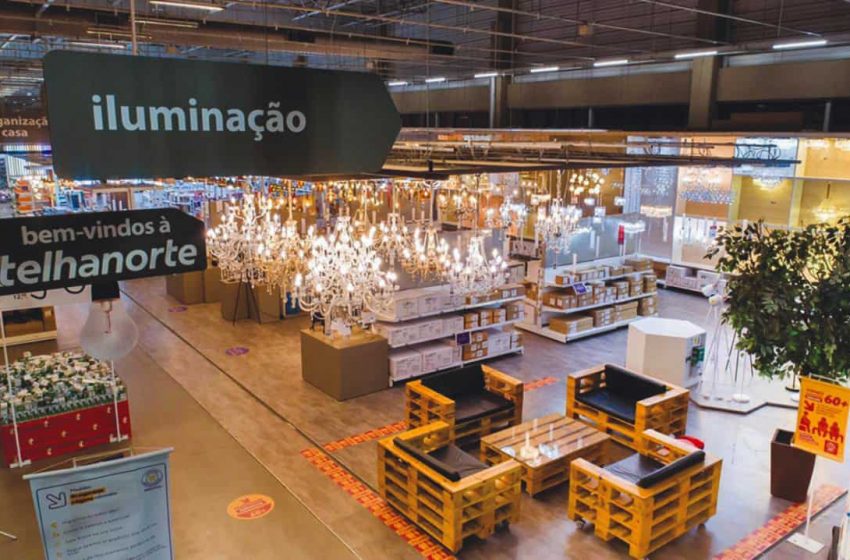
Telhanorte innovates with startup culture
Created in the north of the city of São Paulo, in 1976, by the brothers-in-law Rinaldo Grecco and Lazaro Paulino da Rosa, the company prints in its name its initial purpose, the sale of roofing tiles, which diversified in the 1980s and 1990s. Today, Telhanorte sells approximately 40 thousand items, ranging from the house foundation to decoration. The company is represented by its 72 stores, distributed mainly in the capitals of the States of São Paulo, which accounts for 65% of sales, Rio Grande do Sul, with 20 % of sales, Minas Gerais and Paraná.
Acquired in 2000 by the Saint-Gobain Group, holder of several brands that operate in the civil construction sector, the company accelerated the modernization process. Juliano Ohta, a business administrator from Fundação Getúlio Vargas, with a master’s degree from the École Supérieure de Commerce in Paris and a graduate degree from Harvard Business School, has been the CEO of Saint-Gobain Distribuição Brasil for 3 years now. Parent company of Telhanorte and Tumelero, Saint-Gobain Distribuição Brasil represents the largest network of construction materials in Rio Grande do Sul. The executive has been in the group for 18 years.
Of all the product categories of the chain, the finishing product is the most relevant, accounting for most of the revenue. Small appliances, also present in the mix, are promising, says Juliano. “The category has high potential, we see a great possibility. It is a waste not to sell products like blenders and coffee machines. They are an interesting complement.” Items related to house organization and gardening are on the rise. “The gardening category has grown a lot, it is a trend”, adds the CEO.
New concept
The chain, with stores that reach 8,000 m², entered the segment of smaller units last year. These new units are called TelhanorteJá!, and their areas range from 200 to 500 m². The objective is to offer complete solutions for the work, in materials and services. The services are offered by means of partnerships. The first TelhanorteJá!, with 250 m², was opened in last year in October, in the São Paulo neighborhood of Vila Madalena. Another four units will be opened later this year to serve regions that do not have spaces for gigantic stores.

The trend is being reversed, since the large units are not sustainable, explains Juliano. “In 10 years, we will have smaller stores, with a reduction in the number of shelves, which will be an experience point for the consumer. He or she can go to the physical store, see the product and buy online, picking it up at the drive-thru or at the distribution center, if he or she wants, so as not to waste time.” Currently, Telhanorte-Tumelero has a drive-thru facility in Rio Grande do Sul.
In chain stores, sectors such as chandeliers and lamps are undergoing transformations. “We placed several large screens for the consumer to see how the products will look in the environment. Our idea is to have technicians to provide assistance to the customer and sell the installation. It is a mixed point, neither entirely technological nor just shelves. Either way, I will need less space”, reports the CEO.
Between the physical and the digital
Physical stores cost a lot of money, and variable profitability is a major challenge in e-commerce, which also has high expenses to attract the customer to the mix of products offered and regarding transportation. “The marketplace for large chains is profitable. However, ours is still small – it has 20 sellers. But we are going to enter with our products, because we want to be a reference in everything that is for the home”, says Juliano
“The small appliances category has high potential. It is a waste not to sell products like blenders and coffee machines.”
Since the second half of last May, sales have grown in the double digits, says the CEO. “I credit this to the work of my team, with employees who have been with us for many years, but we also innovate a lot. We created a startup culture, the need made us test several things.” In the pandemic, he created a mobile store, accommodated in a truck parked all day in the condominiums. It included 700 products, including those of the maintenance sector. He also created virtual visits to his stores.
“Our challenge is to identify who the customer is in a short period, customize the service and provide assistance.”
With 4 thousand employees, the company is proud of the quality of its customized service, with assistance, and of the delivery of products within the agreed term and with the monitoring of all orders along the way. “A decisive point in the chain is our logistics, the best in the market”, assures the CEO. Telhanorte-Tumelero has four distribution centers, one in each state where it is present.
From now on
There are many challenges to be faced by all networks in the post-pandemic period, starting with the consumer, who remains the same, but goes through different moments. “Our challenge is to identify who the customer is in a short period, customize the service and provide assistance,” says Juliano, who sees another difficulty this semester. “The big problem with retail is the lack of jobs and credit. The money is not reaching small businesses”, he adds.

The company considers itself privileged for having been closed only for two weeks during the pandemic. However, it believes in difficulties for the retail sector, since the effects of unemployment will be felt by the market this next October, believes the CEO. “In my segment, which serves people who care for their homes, I am afraid of the hangover. The recession will bring concern about prices, and competition will be fierce, more difficult. It is a post-pandemic trend.”
Re-planning will be important for all retailers. In the case of Telhanorte-Tumelero, with the pandemic, the digital sector has gained greater relevance in investments. “It has been a learning experience to improve our ability to see and listen more.” During the period, the company perfected the product categories, maintained its entire team, did not reduce salaries and scheduled the return to normal for January 2021, in a more flexible way.
By Leda Cavalcanti
Source: Eletrolar News Magazine #137





